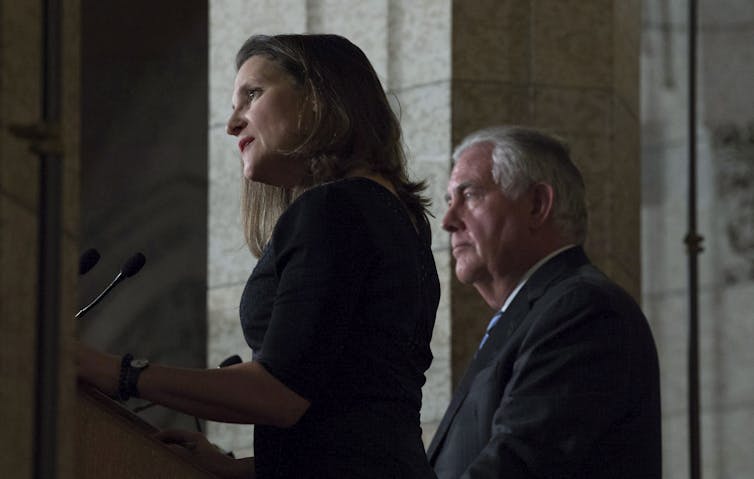This article was originally published onÃ˝, which features includes relevant and informed articles, written by researchers and academics in their areas of expertise and edited by experienced journalists.
is an associate professor in International Development Studies at π˚Ω¥ ”∆µ University.
U.S. President Donald Trump and North Korean leader Kim Jong-un should never talk to each other , or through Twitter. Two unpredictable, nuclear-armed egotists are a threat to themselves and to the world, regardless of the size of their buttons.
North Korean Leader Kim Jong Un just stated that the “Nuclear Button is on his desk at all times.” Will someone from his depleted and food starved regime please inform him that I too have a Nuclear Button, but it is a much bigger & more powerful one than his, and my Button works!
— Donald J. Trump (@realDonaldTrump)
Fortunately, cooler heads are now . Still, this is no time for South Korean President Moon Jae-in, nor the international community, to get comfortable with Kim Jong-un.
North Korea flouts international agreements, bolsters its economy through and is responsible for .
As a researcher on social justice and human security in North Korea, I have a reminder for Canadian Foreign Affairs Minister Chrystia Freeland and U.S. Secretary of State Rex Tillerson as they prepare to : Kim Jong-un runs a feudal gangland, not a nation state. The rules of diplomacy do not apply to the Hermit Kingdom.
North Korea is isolated, hungry, without power and without allies. Yet Kim gathers resources for nuclear proliferation, missiles and prison camps. This is thanks to his . The international community has mistakenly ignored them.
How to deal with Kim’s belligerence? View him as a thug. And like any gangster, understand how he makes money and what really scares him.
First, target those who profit with Kim. Second, empower to North Korea’s grim reality. Their voices matter both within and outside of North Korea.
Kim acquires weapons by sea, he pays for them with , and cryptocurrency. Masterful smugglers, North Korean vessels , shell companies process the funds, and other vessels entering North Korean waters deceptively turn off their broadcast identifiers.
‘Protector’ of North Koreans
I interviewed numerous North Korean defectors for three years. . I make two conclusions about how the international community should approach North Korea.
First, Kim holds power through a projected . He is the protector of the North Korean people. He may not provide enough food, and he may send them to prison camps, but only he can protect against pending violence from the United States.
Missile launches and nuclear tests pose little threat to the West. They are symbolic demonstrations of power for his compatriots.
Second, in order to prop up his image as the Great Marshal, Kim collects his military resources below the radar. Illegal , , , , , and bring in cash. And there are global markets for all, accessed through shady diplomats and shadowy shell companies. They skirt sanctions with impunity.
Formal diplomacy fails as North Korea relies more on the illicit, rather than the legitimate, international community. Until now.
Ã˝
Ã˝

Ã˝
Ã˝
Recent , the and the European Union are smarter. They target Kim’s financial environment. Instead of sanctioning the target, new sanctions attack the banks and maritime operators that help him.
and the regime is taking to to acquire goods — a high-risk, low-return operation. Kim’s options are getting fewer.
It’s a start, but not enough.
Targeting Kim’s markets for missile tests and nuclear proliferation is good policy. It is easier, and safer, to prevent missiles getting in to North Korea than it is once they’re flying out.
However, North Korea’s trading partners are widespread and include businesses around the world, notably in , , and even .
Recognize that Kim’s greatest fear is having his compatriots and the world know how weak he is. The missiles are more show than threat. It’s why Kim is not fazed by Donald Trump’s half-baked tweets.
Kim nervous about defectors’s stories
He is, however, deeply frightened of . Their testimony will shatter his reputation and possibly land him in the International Court of Justice.
North Koreans are unlikely to oust Kim themselves and rebel against , the regime’s rigid social control system. China also fears the thought of any civil conflict in North Korea that could lead to a massive .
Strategic sanctions against North Korea are starting to put Kim in a bind. in North Korea, and Kim will blame sanctions for upcoming food shortages.
Freeland, Tillerson and Moon must remain vigilant with smart sanctions and not trust Kim to make good on any agreement.
![]() Instead, they must identify those who finance Kim, block their revenues and deal with him like an international criminal, not as a head of state.
Instead, they must identify those who finance Kim, block their revenues and deal with him like an international criminal, not as a head of state.
Read the on The Conversation.
π˚Ω¥ ”∆µ
University is a founding partner of The Conversation Canada, a
new-to-Canada online media outlet providing independent, high-quality
explanatory journalism. Originally established in Australia in 2011, it
has had more than 85 commissioning editors and 30,000-plus academics
register as contributors. A full list of articles written by π˚Ω¥ ”∆µ
academics can be found onÃ˝.

